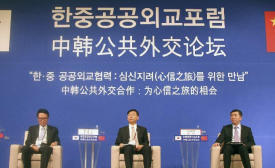united states
China seemed to take the air out of the Geneva Accord on Iran with its simultaneous announcement last week that it is creating an Air Defense Identification Zone (ADIZ) in the East China Sea. The ADIZ will be implemented by the Chinese Ministry of Defence and obliges all aircraft flying in the zone to accommodate a number of rules including: the identification of flight plans, the presence of any transponders and two-way radio communication with Chinese authorities.
Japanese Prime Minister Shinzo Abe said yesterday he would discuss China's air defence identification zone with US Vice-President Joe Biden in Tokyo to co-ordinate their stance after apparently contradictory responses. China raised regional tensions with its declaration last weekend of the zone, which covers islands in the East China Sea at the centre of a dispute between Beijing and Tokyo. Aircraft traversing the area are required to submit their flight plans.
After waiting out an early-afternoon downpour, Vice President Joe Biden and the U.S. delegation emerged into the humid heat to tour the $5.2-billion canal expansion. Baltimore Mayor Stephanie Rawlings-Blake snapped pictures with her cellphone. Philadelphia Mayor Michael Nutter beamed with curiosity as he walked and questioned a site supervisor.
Nicaragua has authorized the militaries of the United States and Russia to undertake drug interdiction in Caribbean waters successfully claimed from Colombia in the International Court of Justice last year, in a move likely spurred by political motivations.
The Canadian embassy in Washington, D.C., opened its doors last week to the city’s digital diplomats for an event where they could brag about their use of social media and pick up some tips. A dozen embassies and international organizations, including the World Bank and European Union delegation, participated in the “Digital Diplomacy Open House” that was held in partnership with the Digital Diplomacy Coalition.
Numerous governments and citizens throughout the world would like to see an effective counterbalance to China in East Asia. Korea, with its commitment to democracy, sophisticated economy, and long-established ties to the United States and other Western countries, is in a strong position to play this role, if it chooses to do so.

SEOUL --- At a conference here sponsored by the Korea Foundation, several dozen scholars and practitioners grappled with questions related to Korea’s global and regional diplomatic posture. My own suggestions as a conference participant centered on two questions
• How does public diplomacy relate to the strategic interests of Korea as a leader in East Asia and more specifically as a counterweight to Chinese influence?
• In what ways might new media be used to enhance Korea’s development of innovative public diplomacy programs?
Emergency relief provided by U.S. troops in areas devastated by typhoon Haiyan in the central Philippines makes a strong case for the two allies to clinch a new military accord, Manila's foreign minister said on Monday. The Philippines and the United States have been negotiating a new security agreement allowing wider and more prolonged access for the U.S. military at bases and other facilities in its former colony. It also provides for storage of equipment and supplies for humanitarian and maritime operations.







